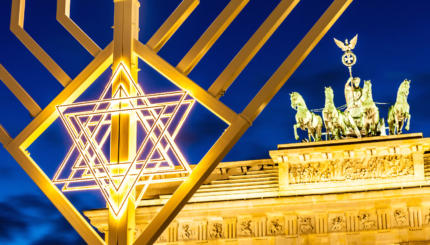The Loyal Other? Making and Breaking of Jewish Identity Today
Juxtaposing the positions of Jews – and Jewish artists and cultural workers – this panel will discuss the relationship between the Jewish identity in contemporary Germany and Russia and the histories of the Jewish communities in these countries. How do the present-day notions of multiculturalism and hybridity problematize the notion of a fixed Jewish identity? What are the artistic strategies when it comes to integration into a bigger national narrative and what are the mechanisms of alienation from it? What are the relationship between artists, institutions, and audiences within the discourse of identity politics, ‘ethnic quotas’ and policies of community engagement?
Panelists:
German poet, writer, and stage performer Max Czollek will talk about the making and breaking of Jewish identity in contemporary Germany. Czollek will discuss the German memory culture and the radical change of the Jewish population in Germany, induced by Jewish immigration from the former Soviet Union starting 1989. Is the current dynamics of Jewish identity in Germany leading to a fundamentally new beginning?
Russian-Israeli artist Haim Sokol will speak about modern Yiddish studies and culture – including in Russian and Israeli context – as taking place in the shadow of a loss. With the exception of the Haredi communities, most Yiddish speakers today are not native speakers. But Yiddish is not a dead language. It is the language of the dead. Therefore, for Sokol, the study of Yiddish and, in general, Jewish culture and history is connected with the concept of redemption: “The well-known expression – yidish redt zikh (Yiddish speaks [by] itself) – acquires a tragic meaning in post-war Europe. Yiddish is a language without a body. I mean of course, primarily the physical extermination of European Jewry by the Nazi regime and its accomplices. But one should also not forget the forced Russification and murder of the Jewish cultural elite in the USSR, and the suppression of Yiddish culture in Israel.”
American art historian and the author of the book “Turks, Jews, and Other Germans in Contemporary Art” Peter Chametzky will speak about the notions of multicultural, cosmopolitan, hybrid, and un-fixed identity in German visual arts. Chametzky writes “By cosmopolitan, I mean to break with the normative stereotype that defines Germans as White and Christian. I am also alluding to the long and continuing history of Jews being labeled “cosmopolitans,” both in a positive and more often negative sense. Following Anthony Appiah and his book Cosmopolitanism, I wanted to present identities that are hybrid and transnational in a positive light. And like Max Czollek, I want to argue that the compulsion to “integrate” to a normative and outdated societal standard is counterproductive to individuals, to groups, and to the society as a whole.”
The event listed here is hosted by a third party. My Jewish Learning/70 Faces Media is not responsible for its content or for errors in the listing.


